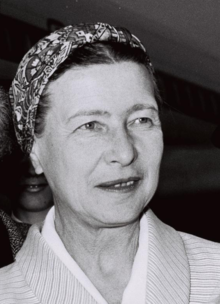
Back Simone de Beauvoir Afrikaans Simone de Beauvoir ALS Simone de Beauvoir AN سيمون دي بوفوار Arabic سيمون دو بوڤوار ARY سيمون دى بوفوار ARZ Simone de Beauvoir AST Simone de Beauvoir AVK Simone de Beauvoir Aymara Simona de Bovuar Azerbaijani
Simone de Beauvoir | |
|---|---|
 Beauvoir in 1967 | |
| Born | Simone Lucie Ernestine Marie Bertrand de Beauvoir 9 January 1908 Paris, France |
| Died | 14 April 1986 (aged 78) Paris, France |
| Resting place | Montparnasse Cemetery, Paris |
| Education | University of Paris (BA, MA) |
| Occupations |
|
| Notable work | The Second Sex (1949) |
| Partners |
|
Philosophy career | |
| Era | 20th-century philosophy |
| Region | Western philosophy |
| School | |
Main interests | |
Notable ideas | |
| Signature | |
| Part of a series on |
| Feminist philosophy |
|---|
 |
Simone Lucie Ernestine Marie Bertrand de Beauvoir (UK: /də ˈboʊvwɑːr/, US: /də boʊˈvwɑːr/;[2][3] French: [simɔn də bovwaʁ] ⓘ; 9 January 1908 – 14 April 1986) was a French existentialist philosopher, writer, social theorist, and feminist activist. Though she did not consider herself a philosopher, nor was she considered one at the time of her death,[4][5][6] she had a significant influence on both feminist existentialism and feminist theory.[7]
Beauvoir wrote novels, essays, biographies, autobiographies, and monographs on philosophy, politics, and social issues. She was best known for her "trailblazing work in feminist philosophy",[8] The Second Sex (1949), a detailed analysis of women's oppression and a foundational tract of contemporary feminism. She was also known for her novels, the most famous of which were She Came to Stay (1943) and The Mandarins (1954).
Her most enduring contribution to literature are her memoirs, notably the first volume, Mémoires d'une jeune fille rangée[9] (1958).[10] She received the 1954 Prix Goncourt, the 1975 Jerusalem Prize, and the 1978 Austrian State Prize for European Literature. She was also nominated for the Nobel Prize in Literature in 1961, 1969 and 1973.[11] However, Beauvoir generated controversy when she briefly lost her teaching job after being accused of sexually abusing some of her students. She and her long-time lover, Jean-Paul Sartre, along with numerous other French intellectuals, campaigned for the release of people convicted of child sex offenses and signed a petition which advocated the abolition of age of consent laws in France.[12]
- ^ O'Brien, Wendy, and Lester Embree (eds), The Existential Phenomenology of Simone de Beauvoir, Springer, 2013, p. 40.
- ^ Wells, John C. (2008). Longman Pronunciation Dictionary (3rd ed.). Longman. ISBN 978-1-4058-8118-0.
- ^ Jones, Daniel (2011). Roach, Peter; Setter, Jane; Esling, John (eds.). Cambridge English Pronouncing Dictionary (18th ed.). Cambridge University Press. ISBN 978-0-521-15255-6.
- ^ Pardina, María Teresa López (1994). "Simone de Beauvoir as Philosopher". Simone de Beauvoir Studies. 11: 5–12. doi:10.1163/25897616-01101002. ISSN 1063-2042. JSTOR 45173538.
- ^ Bergoffen, Debra; Burke, Megan (2021). Zalta, Edward N. (ed.). "Simone de Beauvoir". The Stanford Encyclopedia of Philosophy (Winter 2021 ed.). Metaphysics Research Lab, Stanford University. Retrieved 9 April 2022.
- ^ Cohen, Patricia (26 September 1998). "Beauvoir Emerges From Sartre's Shadow; Some Even Dare to Call Her a . . . Philosopher". The New York Times. ISSN 0362-4331. Retrieved 9 April 2022.
- ^ Bergoffen, Debra (16 August 2010). Zalta, Edward (ed.). "Simone de Beauvoir". Stanford Encyclopedia of Philosophy (2010 ed.). Stanford University. ISSN 1095-5054. Retrieved 11 June 2021.
- ^ "Simone de Beauvoir". The Stanford Encyclopedia of Philosophy. Metaphysics Research Lab, Stanford University. 2023.
- ^ "Mémoires d'une jeune fille rangée - Simone de Beauvoir". Babelio (in French). Retrieved 2 March 2023.
- ^ Norwich, John Julius (1985–1993). Oxford illustrated encyclopedia. Judge, Harry George., Toyne, Anthony. Oxford [England]: Oxford University Press. p. 40. ISBN 0-19-869129-7. OCLC 11814265.
- ^ Nomination archive – Simone Lucie Ernestine Marie B de Beauvoir nobelprize.org
- ^ Henley, Jon (23 February 2001). "Calls for legal child sex rebound on luminaries of May 68". The Guardian. Retrieved 28 December 2017.